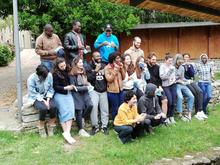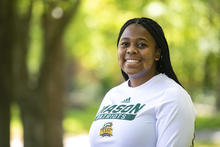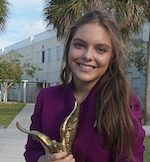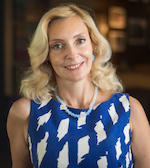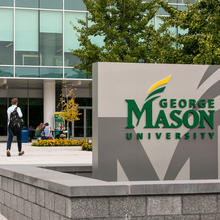- June 10, 2021
Can enemy groups learn to develop compassion for one another? That was the question Carter School professor Daniel Rothbart set out to answer in his research at Rondine, a two-year “laboratory for peace.” Now, the results are in.
“This is the first in-depth case study of compassion among civilians who live in conflict zones,” said Rothbart, who collaborated with George Mason University professors Thalia Goldstein, Marc Gopin and Karina Korostelina. “We hope this is a model that can help create new practices for peacebuilders to cultivate compassion.”
- May 10, 2021
In April, Natalia Kanos was elected Mason’s new student body president.
- April 28, 2021
Illegal goods can have deadly consequences. Whether it’s a counterfeit face mask that doesn’t provide a frontline worker adequate protection from COVID-19, or a counterfeit pill laced with fentanyl (a synthetic painkiller 50-100 times more potent than morphine), millions of lives can be at risk.
A multidisciplinary team of researchers and students at George Mason University is working to stop such criminal activity. Thanks to a nearly $650,000 grant from the National Science Foundation (NSF)—and a $16,000 grant supplement awarded to two undergraduates on the team—they will be investigating how to disrupt illicit supply chains, influence policy, and ultimately save lives.
The eastern region of Ukraine has been an intense battleground since 2014, when Russia controversially annexed the Ukrainian peninsula of Crimea and invaded the Donbass region in eastern Ukraine. Though a ceasefire was called, it has been violated daily. More than 10,000 people have died and roughly 1.6 million are registered as internally displaced people (IDP).
But a step toward hope and peace may be on the horizon, thanks to George Mason University’s Carter School for Peace and Conflict Resolution, and their new project funded by a $50,000 grant from the U.S. Embassy in Ukraine.
Tehama Lopez Bunyasi, assistant professor in the Carter School for Peace and Conflict Resolution, explains how using our democratic freedoms will help overcome racism in America.
- December 11, 2020
Of the more than 4,000 lynchings of Black Americans that took place in the United States between 1865 and 1950, at least 43 cases occurred in Maryland.
George Mason University’s John Mitchell Jr. Program (JMJP), housed within the Carter School for Peace and Conflict Resolution, has been helping research several of these cases since 2019 to support the Maryland Lynching Truth and Reconciliation Commission. In October, they received news that they will be taking their research to the next level, thanks to a $300,000 Department of Justice grant they helped secure for the commission. The Political Leadership Academy will be one of the Carter School’s primary means of outreach to policy-making circles and a direct contribution toward bi-partisan decision making in our country
- October 13, 2020
The Carter School has partnered with Restorative Arlington, a new initiative aimed at incorporating restorative justice practices into Arlington County’s public schools, legal system and community.
- September 23, 2020
Fakhira Halloun holds two contradictory identities: She is Palestinian and an Israeli citizen.
It wasn’t until she began facilitating peace dialogues between Israelis and Palestinians in Jerusalem in 2000, that she realized Palestinian citizens of Israel could be the missing link in bridging ties between the two groups. - September 18, 2020
A number of Carter School faculty and staff members are working closely with President Gregory Washington to make our university a national model for anti-racism and inclusive excellence.

